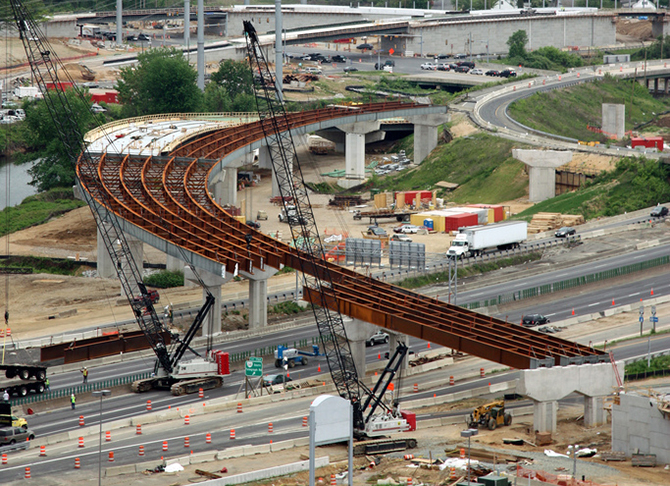Since 1970, the National Environmental Protection Act has required federal agencies to consider the impacts of their projects on air, water, and soil pollution -- but not on climate change.
Until recently, carbon dioxide, which causes global warning, wasn’t classified as a pollutant and so couldn’t be regulated under environmental laws. The EPA in 2009 asserted its power to regulate carbon emissions but hasn’t applied it to NEPA analyses for infrastructure – until now.
President Obama hasn’t made the announcement yet, but Bloomberg reported Friday that he “is preparing to tell all federal agencies for the first time that they should consider the impact on global warming before approving major projects, from pipelines to highways.”
There's more – projects could also be evaluated according to resiliency in the face of climate change. Would the new infrastructure be destroyed if faced with flooding, drought, or other severe weather? Bloomberg reports that the White House is also “looking at” requiring these climate adaptability and resiliency reports for projects “with 25,000 metric tons of carbon dioxide equivalent emissions or more per year, the equivalent of burning about 100 rail cars of coal.”
Does this mean no more highways?
The conservative National Review’s headline about the changes was, “Did Obama Just Block Keystone?” Columnist Stanley Kurtz speculated that Obama could publicly approve the Keystone XL pipeline and then let the new environmental review process rule it out.
Could the same go for highway projects?
Bloomberg reports that the prospects have businesses “freaked out,” in the words of Ross Eisenberg, vice president of the National Association of Manufacturers.
Kurtz's fear of an automatic disqualification for carbon-positive projects isn't quite the way NEPA works, though. A finding that a project will increase pollution, including carbon emissions, would be unlikely to actually block any environmentally damaging highway projects that receive federal funding.
“NEPA requires you to do an analysis of alternatives,” said Ilana Preuss of Smart Growth America. “It doesn’t require you to make a different decision.”
Plus, an agency looking to build a highway can stack the deck so that even the alternatives examined are just as harmful. A NEPA report evaluates a proposed project's environmental impacts against those of an alternative that would serve the same “purpose and need.” If a transportation agency says it "needs" to a build a six-lane road through a particular wetland, NEPA is just going to examine different ways of doing that. It’s not going to ask whether the agency has considered transportation options that don't involve road-building.
Until now, NEPA has examined project impacts on air, soil, and water -- and most projects do have a negative impact on those things. If a NEPA review showing negative environmental impacts was all it took to shut down a road project, we wouldn’t have any roads.
NEPA’s power is in giving communities the information they need to fight the planned project, if the report finds that it will cause more environmental damage than an alternative. Or people can ask for "mitigation" of the damage that will be inflicted. And even that approach has limits -- you'll probably only win a lawsuit if the agency hasn't followed the required procedure. In addition, MAP-21 weakened NEPA to allow for quicker project delivery, giving communities less time to decide to litigate and punishing agencies for holding up projects.
So even a NEPA report that shows that a project will increase greenhouse gas emissions and cause other destruction may have no impact, if it doesn't galvanize communities to stop or modify the project.
Even the “freaked out” Ross Eisenberg of NAM told Bloomberg he is really just worried about delays. “I don’t think the answer is ever going to be ‘no,’” he said, “but it can confound things.”
How to use the new rule
Still, Preuss of Smart Growth America said this expansion of NEPA could have an “enormous” impact on transportation spending, making the conditions for road expansion less favorable. But it depends on how the White House Council on Environmental Quality interprets the new rule.
“It’s all in how it gets implemented,” Preuss said. “If the alternatives that they look at, which often happens with NEPA, are either the cars idling in traffic on the road or streaming traffic because we add a lane -- if those are the only options they’re looking at, they’re going to get the same answers that they were getting before, that still keep telling them to look at high flow traffic. But if the overall guidance is more comprehensive, it could really encourage folks to look at all different transportation options.”
A requirement to take a closer look at how infrastructure causes and adapts to climate change can only be a positive thing, even if it isn't an instant game-changer. It will make transportation agencies and public officials look at projects differently, and a method with a lighter environmental footprint might be more likely to emerge as the best way to do things. It could also nudge agencies away from building in particularly vulnerable sites in coastal areas.
Attaching climate considerations to NEPA won’t be seamless. Since climate impacts are global and not necessarily at the site of the proposed project, it doesn’t work like a normal environmental impact review. “Climate impacts are not necessarily considered anywhere in any environmental rule,” said David Burwell of the Carnegie Endowment’s climate program. “So, they’re trying to attach climate impacts to something.”
It might turn out that NEPA isn't the ideal place to do it. One can easily imagine a separate, stronger law actually tying project approval and funding to environmental goals. But in the meantime, a more comprehensive NEPA isn't a bad thing to have.





